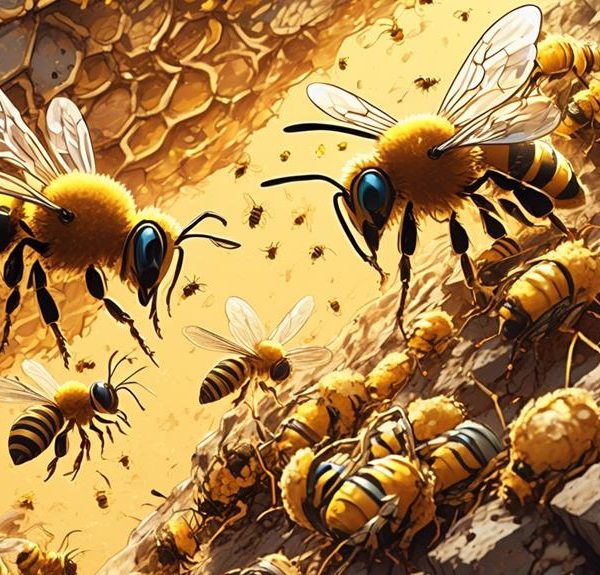Unravel the mystery of honey production as we explore if bees can really make honey from sugar water.
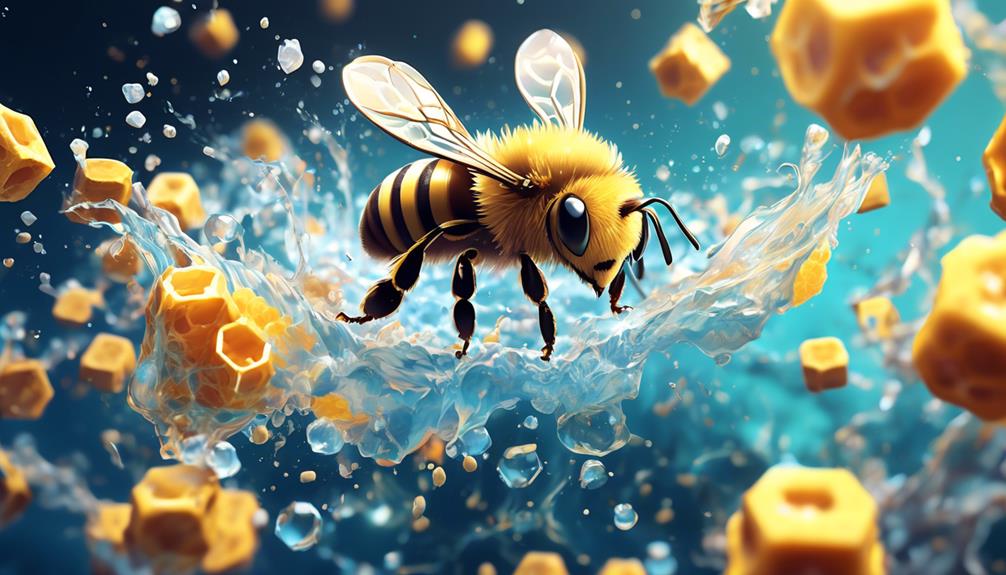
Can Bees Make Honey From Sugar Water
You've watched bees buzz from flower to flower, you've tasted the sweet product of their labor, and you've probably even felt the sting of their defense. These little creatures, with their intricate dance and unyielding work ethic, have intrigued humans for ages.
One question that may be buzzing in your mind is whether bees can make honey from sugar water instead of nectar. On the surface, it seems logical. After all, isn't honey just a sweet substance produced by bees?
Yet, as we delve deeper into the sophisticated world of bees and their honey production, you may find the answer isn't as straightforward as you'd think.
Key Takeaways
- Bees collect nectar from flowers and use enzymes to break it down into simple sugars, which are then deposited into honeycomb cells and thickened into honey through evaporation.
- Nectar is the primary source of sugars for honey production and contains sucrose, proteins, amino acids, and other organic compounds.
- Sugar water, a solution of sugar dissolved in water, is used as a temporary food source for bees during scarcity but lacks the nutrients found in nectar.
- Honey produced from sugar water is less flavorful and nutritious than nectar-based honey, highlighting the importance of preserving natural habitats and nectar sources for bee health.
Understanding Bee's Honey Production
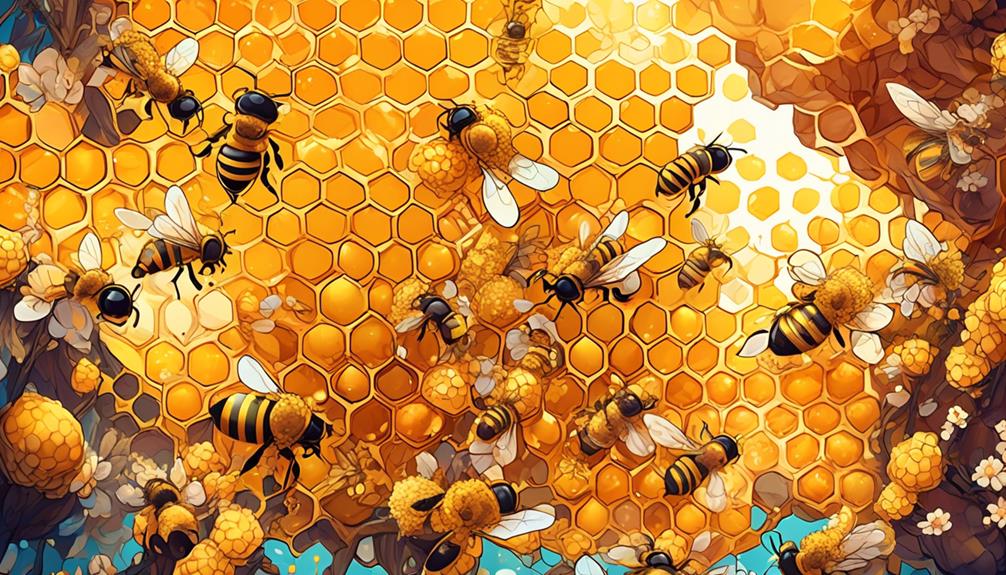
To truly understand how bees make honey, it's essential to delve into the fascinating process that begins with foraging and ends with this sweet, viscous food product. You see, bees collect nectar from flowers, which is basically a sugary water. They store this nectar in their 'honey stomach', where enzymes begin breaking it down into simple sugars.
Back at the hive, the forager bee regurgitates the nectar into the mouth of a house bee. This bee then further breaks down the sugars through a process called inversion. This mixture is then deposited into the honeycomb's cells.
Now, here's where it gets interesting. The bees begin to fan their wings, generating airflow over the honeycomb. This movement accelerates the evaporation of water from the nectar, thickening it into honey.
When the honey reaches the desired consistency, the bees seal the cell with a wax cap. This perfectly preserved honey can stay fresh for years!
The Role of Nectar in Honey-Making
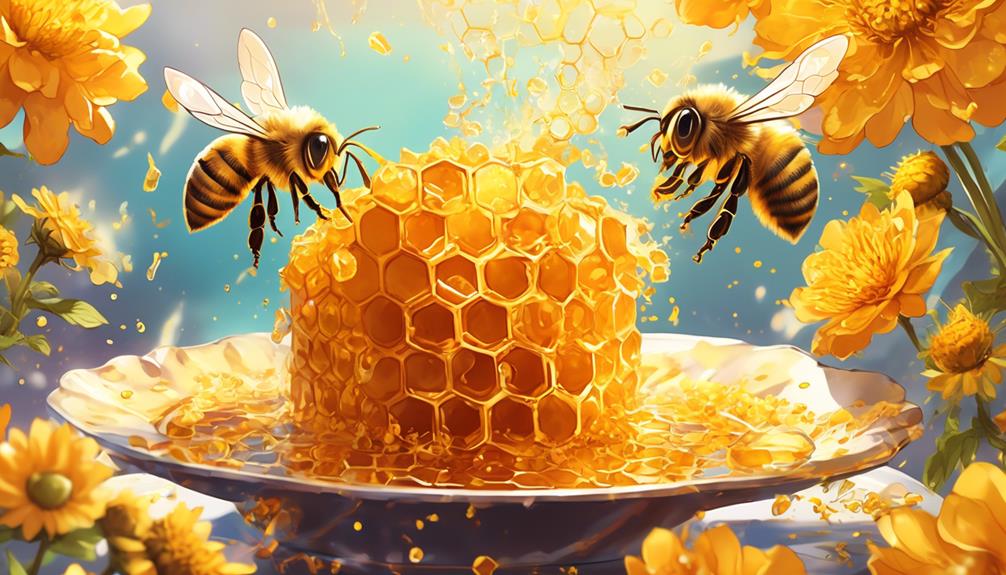
Delving deeper into the honey-making process, you'll find that nectar plays a crucial role as the primary source of the sugars needed for honey production. When honey bees forage, they collect nectar from flowering plants, using their long, tube-shaped tongues to extract this sweet liquid.
Nectar itself is a mixture of water and plant sugars, the most common being sucrose. Yet, it's not all about sweetness. Nectar also contains trace amounts of proteins, amino acids, and other organic compounds that contribute to the unique flavor profiles of different honeys.
Back in the hive, the bees begin to transform this raw nectar into honey. They do this by using an enzyme in their stomachs called invertase, which breaks down the sucrose into simpler sugars – fructose and glucose. This enzymatic process coupled with the constant fanning of the bees' wings to evaporate water, concentrates the nectar, giving us the thick, sweet substance we know as honey.
Sugar Water: What Is It?
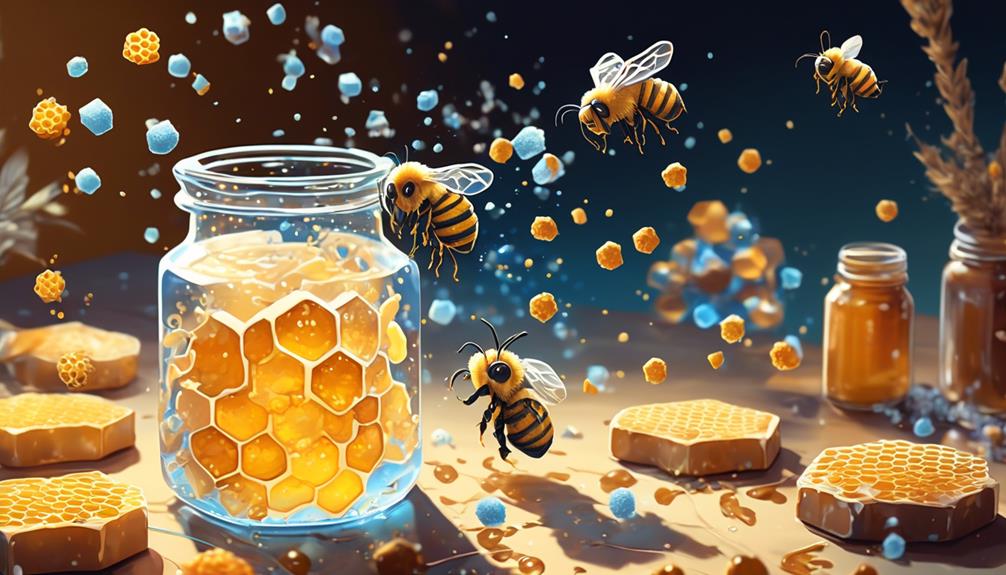
While bees naturally source sucrose from plant nectar, you might wonder about a simpler sugar solution – sugar water, and what exactly it is. Essentially, sugar water is a solution created by dissolving sugar, typically sucrose, in water. It's a straightforward process: you simply mix sugar into water until it's fully dissolved. The ratio of sugar to water can vary, but a 1:1 ratio is common in many uses.
You might be perplexed about how this simple solution could be of any use to bees. Although less complex than nectar, sugar water still offers an energy source. Sucrose, the sugar you're likely using, is a disaccharide made up of glucose and fructose. These simple sugars provide energy for bees, much like nectar does.
However, sugar water isn't nutritionally equivalent to nectar. Nectar contains trace amounts of proteins, amino acids, and other nutrients that sugar water lacks. This doesn't mean sugar water is useless to bees, though. In times of scarcity, beekeepers often use it as a temporary food source to support their hives. Just remember – it's a substitute, not a replacement for the real deal.
Experiment: Bees and Sugar Water
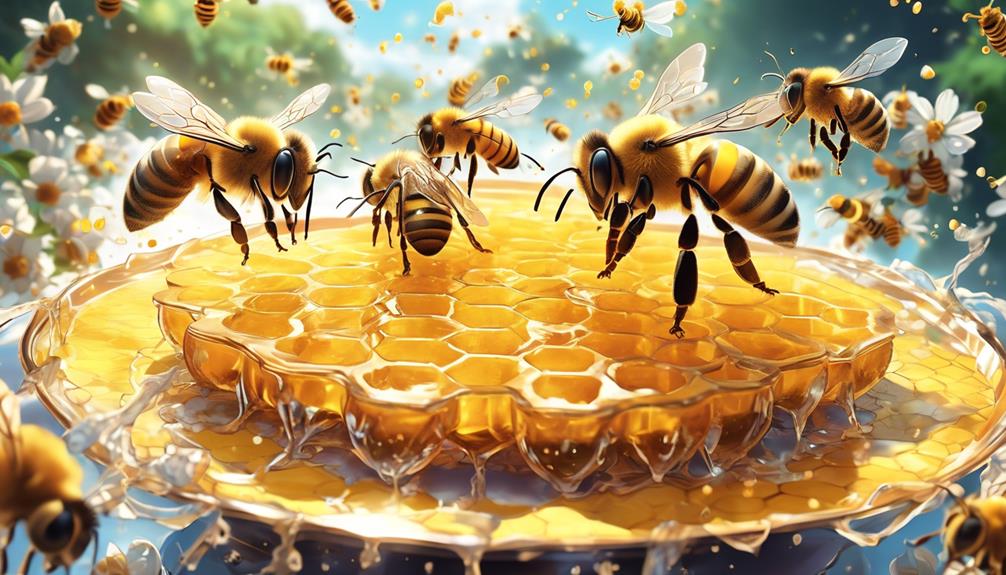
Ever wondered how bees react when presented with sugar water instead of their usual nectar? Let's delve into the fascinating world of bee behavior. In an experiment, sugar water was provided to bees instead of their typical nectar source. Their response? Astounding.
Nectar | Sugar Water | |
|---|---|---|
Foraging Behavior | Bees busily collected nectar, flying from flower to flower | Bees were seen gathering the sugar water diligently |
Honey Production | Honey produced from nectar has a rich, unique flavor | Honey produced from sugar water, surprisingly, was less flavorful |
Bee Health | Bees thrive on natural nectar, which provides essential nutrients | Bees could survive on sugar water, but it lacked the necessary nutrients |
The experiment revealed that while bees can indeed make honey from sugar water, it's not quite the same as their natural nectar-derived honey. The honey produced from sugar water lacked the distinct flavor and nutritional value inherent in nectar-based honey. Furthermore, while sugar water can be a short-term substitute, it doesn't provide the essential nutrients that bees need to thrive. This emphasizes the importance of preserving natural habitats and sources of nectar for bees. Your understanding and empathy could make a world of difference to these industrious insects.
Comparing Nectar-Based and Sugar-Water Based Honey
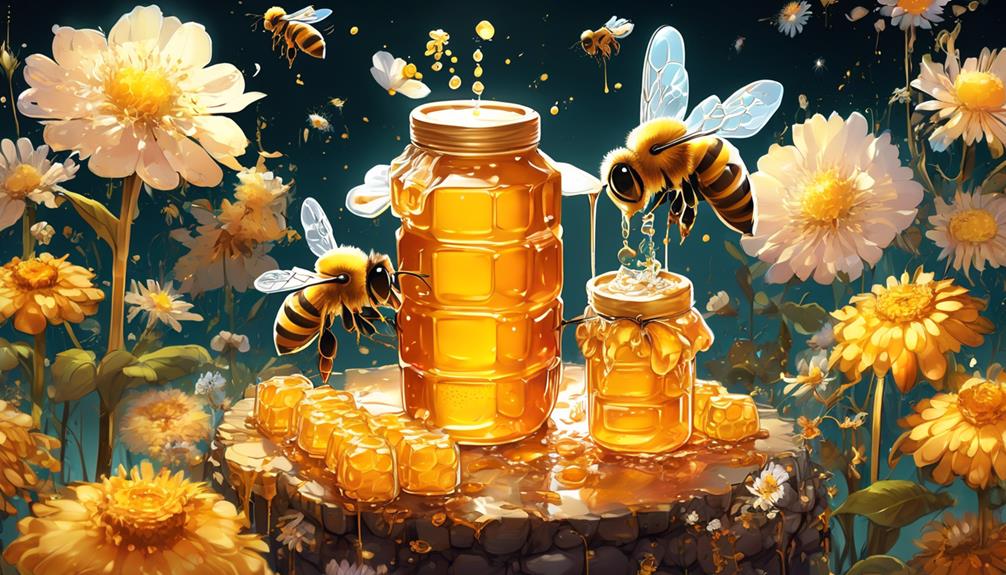
Now, let's take a closer look at the differences between nectar-based honey and sugar-water based honey, understanding the implications each has on the quality, taste, and nutritional content.
Nectar-based honey, the traditional product you're used to, is made when bees collect nectar from flowers. It's rich in natural sugars, vitamins, and antioxidants, contributing to its distinct taste and health benefits.
On the other hand, sugar-water based honey is produced when bees are fed a solution of sugar and water, mimicking the sweetness of nectar. This honey tends to be less complex in flavour, as it lacks the unique floral notes found in nectar-based honey.
Nutritionally, sugar-water based honey falls short. It's primarily sucrose and lacks the variety of nutrients found in nectar-based honey. In terms of quality, it's less viscous and lacks the rich, golden hue of its nectar-based counterpart.
It's essential to note that bees shouldn't be regularly fed sugar-water, as it doesn't provide the necessary nutrients for their health. While it's a useful tool in beekeeping, especially during times of scarcity, it's not a sustainable substitute for nectar.
Implications for Beekeepers and Honey Consumers
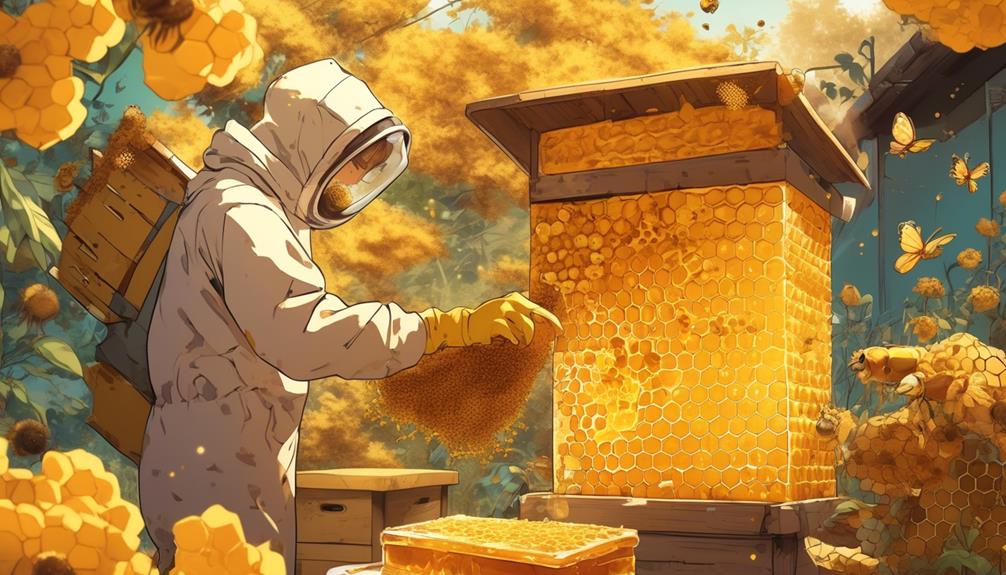
In light of these differences between nectar-based and sugar-water based honey, it's vital for you as a beekeeper or consumer to understand the impact on both the bee population's health and the quality of the honey produced. While feeding bees sugar water is sometimes necessary in times of scarcity, it's not a sustainable solution for long-term bee health. A diet solely based on sugar water lacks the essential nutrients found in nectar, which can lead to malnutrition and weakened immune systems among bees.
As a beekeeper, you should be aware that sugar water-fed bees produce honey that's not as rich in antioxidants, vitamins, and minerals as nectar-based honey. This could affect the market value and consumer perception of your product.
For consumers, the implications are equally significant. Consuming honey made from sugar water mightn't provide the same health benefits as that derived from nectar. The taste and aroma can also be noticeably different. Therefore, it's crucial to support responsible beekeeping practices for the production of high-quality, nectar-based honey.
The health of bees, the quality of honey, and the wellbeing of consumers all intertwine in this complex issue.
Frequently Asked Questions
What Types of Sugars Are Used to Make Sugar Water for Bees?
You're wondering what types of sugars are used to make sugar water for bees. It's typically just white, granulated sugar that's used. You'll want to avoid using brown sugar, honey, or artificial sweeteners as they can harm the bees.
The recipe's simple: just dissolve one part sugar into one part warm water. It's important to note, this sugar water should only be a supplement to the bees' diet, not their main food source.
How Does the Taste of Honey Produced From Sugar Water Differ From Nectar-Based Honey?
When you taste honey made from sugar water, you'll notice it lacks the rich, complex flavors found in nectar-based honey. That's because nectar carries unique floral notes from specific plants, while sugar water doesn't.
It may taste sweeter, but it's missing the depth of flavor that comes from bees processing plant nectar. So, while bees can technically make honey from sugar water, it won't have the same rich taste as traditional honey.
Are There Any Negative Health Effects on Bees When They Consume Sugar Water Instead of Nectar?
Yes, there can be negative health effects on bees consuming sugar water instead of nectar.
Nectar naturally contains essential nutrients, which aren't found in sugar water. Thus, long-term substitution can lead to malnutrition.
Also, sugar water can ferment if not consumed quickly, leading to potential digestive issues.
It's important to remember, while you may be trying to help bees, providing them with natural, nectar-rich sources of food is always the best approach.
Is Honey Made From Sugar Water Considered Natural or Artificial?
Yes, bees can make honey from sugar water. However, it's not the same as natural honey made from nectar.
Natural honey contains beneficial enzymes, vitamins, and antioxidants which sugar water lacks. So, honey made from sugar water is considered artificial. It's a sort of 'pseudo-honey', lacking the nutritional value and complex flavors of honey made from nectar.
Therefore, while it's technically honey, it's not the real deal.
Can Bees Survive Solely on Sugar Water Without Any Access to Nectar?
Yes, bees can survive on sugar water alone, but it's not ideal. Sugar water doesn't contain the essential nutrients found in flower nectar. So while they'll get by, they won't thrive.
Imagine only eating candy bars for nourishment. You'd be alive, but not healthy. It's the same for bees.
Sugar water should only be used as a supplemental feed during times of scarcity, not as a permanent substitute for nectar.
Conclusion
Yes, bees can indeed make honey from sugar water. However, it's important to note that this 'honey' lacks the nutritional value and unique flavors of nectar-based honey.
This experiment does pose significant implications for beekeepers and consumers alike, highlighting the need for careful management and transparency in honey production.
So, while sugar water can sustain bees, it's no substitute for the diverse, nectar-rich environment they naturally thrive in.

